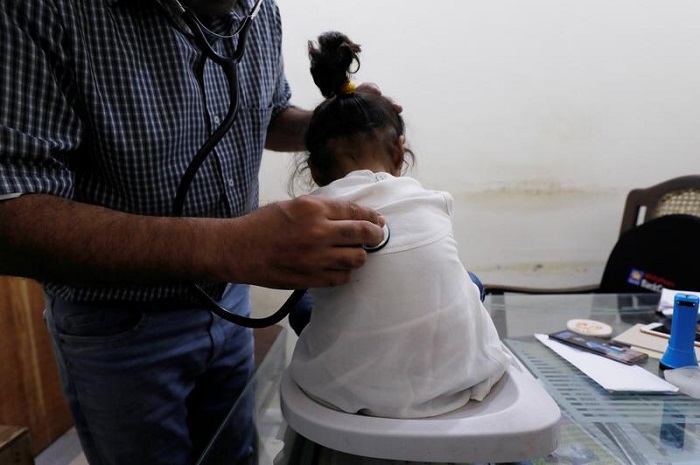Dozens getting HIV positive in four Sindh districts on weekly basis
Deadly virus now spreading into the general population in four districts of Sindh at alarming rate
March 07, 2023

Dozens of people, both adults and children, are testing positive for HIV on weekly basis in the four Talukas of Sindh where the spread of HIV in the general population is being observed since 2019, federal and provincial officials disclosed on Monday.
“HIV cases are regularly being reported from the four notorious Talukas of Larkana, Jacobabad, Qambar Shahdadkot, and Shikarpur districts, which are geographically attached to each other. Newly infected people include both adults and children and the main reason is poor Infection Prevention and Control (IPC)”, an official of the National Health Services, Regulations and Coordination (NHS, R&C) told The News.
Federal health officials informed that around 21 new HIV cases were reported from these four districts in the last week of February 2023, adding a similar number of HIV-positive cases among both the adults and children that have regularly been reported from this area for the last four years.
“HIV is now spreading into the general population in these four districts of Sindh … from where over 60 percent HIV cases ae being reported from general population while remaining 40 percent are being reported from the key populations including injectable drug users, transgender men, men having sex with men and female sex workers,” the official added.
Pakistan reported the world’s largest HIV outbreak among children in 2019 when hundreds of children were found infected with HIV in Ratodero Taluka of Larkana and since then, around 2,800 children have so far tested positive for HIV in Ratodero and adjoining areas.
Confirming the detection of new HIV cases in the four talukas of Sindh on regular basis, an official of the Communicable Disease Control (CDC) Sindh said the presence of thousands of quacks and poor Infection Prevention and Control (IPC) were the two main reasons behind the spread of HIV in the area.
“The 2019 HIV outbreak is now an ongoing epidemic in the four Talukas which are attached to each other. We are doing massive screening and testing in the area and due to that, every day several people including adults and children are testing positive for HIV. This outbreak in 2019 was in general population due to poor IPC and use of infected needles and syringes, which is still the main cause of HIV spread in the area”, Dr Ershad Kazmi, Additional Director (CDC) (HIV/AIDS) Sindh said.
According to him, following the 2019 Ratodero outbreak, Sindh Health Department and the Sindh Healthcare Commission closed down establishments of thousands of quacks but as time passed and the dust settled, these fake medical practitioners resurfaced and started spreading infectious disease in the community.
“Similarly, IPC guidelines are not being followed by the general practitioners, private hospitals and even the small healthcare facilities except some of the leading tertiary-care health facilities in these districts”, Dr Kazmi said adding that poor IPC practices were the main cause of continuous HIV spread in the area.
He maintained that he had recently drawn the attention of the Director General (DG) of Health Sindh towards the lack of IPC in healthcare settings across Sindh, which was resulting in the spread of HIV and viral hepatitis and urged him to immediately establish an IPC cell in the province to prevent the spread of HIV and other blood-borne diseases in the province.
“Sindh Healthcare Commission was supposed to eliminate quackery but unfortunately, it has miserably failed to fulfill its responsibilities including implementation of IPC guidelines and recommendations. In these circumstances, it has become inevitable to establish an IPC cell headed by a BPS-19 official in the CDC Directorate to map the IPC compliant and non-compliant facilities and take action against those who are violating the national IPC guidelines”, Dr Kazmi added.
HIV (human immunodeficiency virus) is a virus that attacks the body's immune system. If HIV is not treated, it can lead to AIDS (acquired immunodeficiency syndrome). There is currently no effective cure. Once people get HIV, they have it for life.









